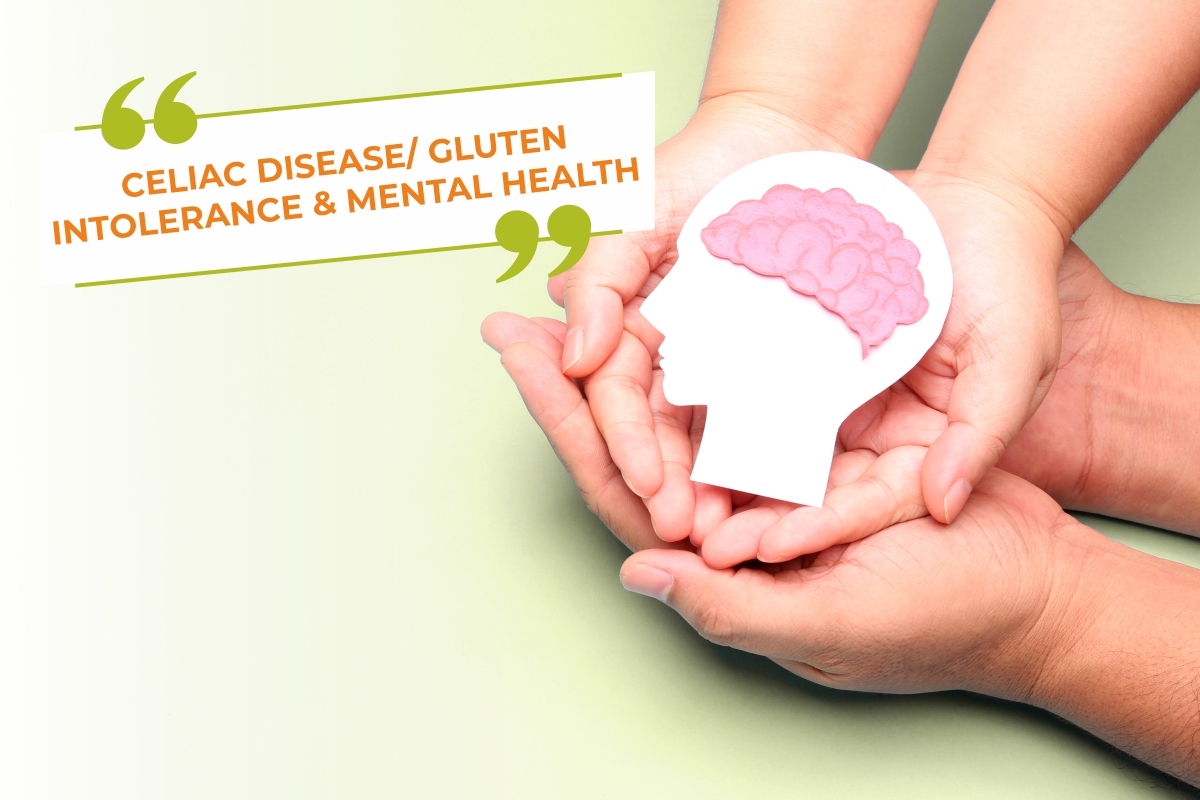Celiac Disease/ Gluten Intolerance and Mental Health

Celiac disease affects about 1% population of the country. Celiac disease is an autoimmune disorder that’s triggered when you eat gluten. It’s also known as celiac sprue, nontropical sprue, or gluten-sensitive enteropathy. Gluten is a protein in wheat, barley, rye, and other grains. It’s what makes dough elastic and gives bread its chewy texture.
When a person with celiac disease intakes gluten they experience symptoms like diarrhea, bloating, fatigue, abdominal pain, nausea, vomiting, etc. It has been affecting your quality of life in several ways like-for a celiac patient it becomes extremely hard to go for outings whether for just a dinner out or taking a few day’s trips to various places. Food becomes a cause of concern in a lot of places to eat out.

It is either not available or people are not that cautious while preparing the food without the danger of cross-contamination. So directly or indirectly one is in a state of constant fear of whatever one is eating whether it is gluten-free or not.
Hence, Celiac disease might be linked to decreased quality of life and certain mood disorders. The effects of the gluten-free diet on these psychological aspects of the disease though are still unclear.
Various other research of the available literature suggests that CD has a considerable psychological impact. Some elements of this may relate to the disease and its biochemical effects, but other aspects relating to the patient’s subjective perception of the disorder and the GFD used to treat it.

While some psychological problems may lessen with time as knowledge of the condition improves and perhaps biochemical abnormalities are corrected, it appears that many patients have ongoing concerns about coping with the diet and do not adhere to it, particularly when going out and in social interaction.
Fatigue is sometimes the unique symptom at CD presentation. The available studies have not been able to show a consistent positive effect of the GFD in diminishing perception of fatigue.
Along with fatigue and depression, people diagnosed with celiac disease show symptoms of anxiety. The most common form of anxiety exhibited by people diagnosed with celiac is social anxiety.
It was found that people with CD usually show avoidant behaviour due to dietary restrictions. Some of the CD patients also feel stigmatized and thus have low self-esteem and excessive feeling of anger and hostility. Overall, levels of anxiety and depression are greater in patients with CD. However, the causes of this may vary at different stages.

This means either before CD diagnosis, patients may express concerns about unexplained symptoms and may feel frustrated about repeated consultations that offer no adequate explanation of their problems. At the time of diagnosis, there may be concerns about investigations and a diagnosis of a long-term condition, although this may be accompanied by a feeling of relief that a diagnosis has finally been made.
To conclude, I would like to recommend that from the time of getting diagnosed and then managing the disease all celiac patients need to be counseled and supported psychologically. I have tried my best to provide psychological support to this community in whatever capacity I could and still working hard for the same. They need support groups that would reduce their anxiety and sadness to a large extent which we trying to provide them for the last 17yrs. They need a resource of authentic gluten-free foods which is also taken care of in our support group.
Since gluten-free diet has also become a food fad hence the sensitivity of preparing this diet has gone for a toss and the only sufferers are celiac patients. As every company is now selling the product by labelling it GF as it looks very fancy and by doing this they can conveniently increase the price too.
Having said that any CD patient-facing reduced quality of life affects its mental and psychological health but if counseled properly by professionals they can develop a lot of resilience to deal with this disease.
About the author:

Dr. Ruby Ahuja
Consultant Psychologist

Seema Sethi
Ruby, it’s quite informative 👏👏
Smita Khanna roy chowdhury
Wonderfully penned down Dr.Ruby!Since Gluten free Diet has become biggest food fad people should understand the gravity of CD disease. You are doing Wonderful job to create awareness about it.
Lyn
I’m ցone to inform my little brother, that he should also paу
a visit this website on regulaг basis to obtain updates.
RAJENDRA DHINGREJA
Eating out creates huge social anxiety, in celiacs like us, we keep telling friends and relatives we cannot
eat, and they urge us to eat, it becomes so difficult to explain to them that we just cannot eat anything and
everything.